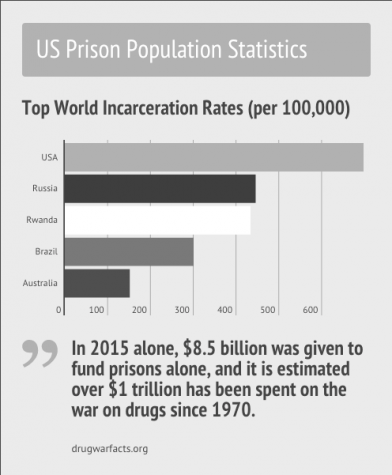Prison reform requires nation to end its war on drugs
March 24, 2016
During the recent political debates, the candidates of both parties have had to address plenty of topical issues: immigration, policy in the Middle East and Asia, terrorism, green energy, trade, banking and so on. Yet, surprisingly, one of the issues closest to home is often left out.
Our current incarceration system has many flaws and needs reform. Too many Americans are trapped by their prison system.
One of the most-cited statistics right now on the overpopulation of US prisons would be that the United States only has five percent of the world’s population, but boasts 25 percent of the world’s prison population. Owing to this disproportionate figure, the US is forced to allocate huge budgets to prisons. In 2015 alone, $8.5 billion was given to fund prisons alone, and it is estimated over $1 trillion has been spent on the war on drugs since 1970.
Considering that drug policy often targets drug users rather than suppliers and that the war on drugs has led to stricter mandatory minimum sentences in the US, it is no surprise that federal, state, and county prisons and jails are estimated to hold over 2 million inmates.
According to the Federal Bureau of Prisons, the war on drugs has filled up approximately 50 percent of US prisons with nonviolent drug offenders. And Pew Research reported that, after stringent drug policy was adopted by the Nixon Administration in 1971, prison population has risen 700 percent.
Given the ineffectiveness of drug policy, it follows that the US should decriminalize most drugs and seek to rehabilitate and educate users and youths. This action would have a much more positive effect on society as a whole.
According to the Drug Policy Alliance, the war on drugs currently costs $51 billion annually; this money could be better spent on rehabilitation and education. At the same time, incarceration and crime rates would diminish, as seen from precedent.
For example, Portugal decriminalized all drugs in 2001 and has a decrease in percentage of adults who have tried drugs, percentage of continuous drug use, and the number of drug-induced deaths.
With Bernie Sanders, Hillary Clinton and Donald Trump all taking stances leaning toward the legalization of marijuana, clearly the drug debate is gaining momentum nationally. In truth, the state of our penitentiaries makes it impossible to neglect prison reform during this election cycle. And with many Upper School seniors soon able to vote, members of the community will have to decide which candidate approaches this immediate problem with the best solution.
This piece was originally published in the pages of the Winged Post on Mar. 23, 2016.


















![“[Building nerf blasters] became this outlet of creativity for me that hasn't been matched by anything else. The process [of] making a build complete to your desire is such a painstakingly difficult process, but I've had to learn from [the skills needed from] soldering to proper painting. There's so many different options for everything, if you think about it, it exists. The best part is [that] if it doesn't exist, you can build it yourself," Ishaan Parate said.](https://harkeraquila.com/wp-content/uploads/2022/08/DSC_8149-900x604.jpg)




![“When I came into high school, I was ready to be a follower. But DECA was a game changer for me. It helped me overcome my fear of public speaking, and it's played such a major role in who I've become today. To be able to successfully lead a chapter of 150 students, an officer team and be one of the upperclassmen I once really admired is something I'm [really] proud of,” Anvitha Tummala ('21) said.](https://harkeraquila.com/wp-content/uploads/2021/07/Screen-Shot-2021-07-25-at-9.50.05-AM-900x594.png)







![“I think getting up in the morning and having a sense of purpose [is exciting]. I think without a certain amount of drive, life is kind of obsolete and mundane, and I think having that every single day is what makes each day unique and kind of makes life exciting,” Neymika Jain (12) said.](https://harkeraquila.com/wp-content/uploads/2017/06/Screen-Shot-2017-06-03-at-4.54.16-PM.png)








![“My slogan is ‘slow feet, don’t eat, and I’m hungry.’ You need to run fast to get where you are–you aren't going to get those championships if you aren't fast,” Angel Cervantes (12) said. “I want to do well in school on my tests and in track and win championships for my team. I live by that, [and] I can do that anywhere: in the classroom or on the field.”](https://harkeraquila.com/wp-content/uploads/2018/06/DSC5146-900x601.jpg)
![“[Volleyball has] taught me how to fall correctly, and another thing it taught is that you don’t have to be the best at something to be good at it. If you just hit the ball in a smart way, then it still scores points and you’re good at it. You could be a background player and still make a much bigger impact on the team than you would think,” Anya Gert (’20) said.](https://harkeraquila.com/wp-content/uploads/2020/06/AnnaGert_JinTuan_HoHPhotoEdited-600x900.jpeg)

![“I'm not nearly there yet, but [my confidence has] definitely been getting better since I was pretty shy and timid coming into Harker my freshman year. I know that there's a lot of people that are really confident in what they do, and I really admire them. Everyone's so driven and that has really pushed me to kind of try to find my own place in high school and be more confident,” Alyssa Huang (’20) said.](https://harkeraquila.com/wp-content/uploads/2020/06/AlyssaHuang_EmilyChen_HoHPhoto-900x749.jpeg)








